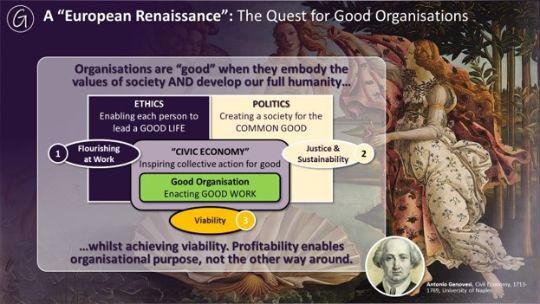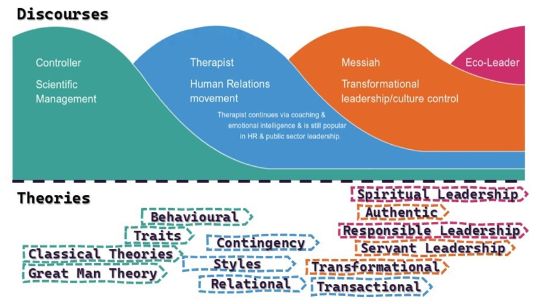
More and more awards for "good companies" that focus on sustainability and social responsibility are entering the employer seal market. But do they live up to their claim of being "good"? We spoke with Prof. Dr. Antoinette Weibel from the University of St. Gallen about her analysis.

Personalmagazin: Ms. Weibel, you and your team have examined various assessment tools that claim to distinguish good companies. There are rankings, awards and certificates among them. How did you select this mix?
Antoinette Weibel: We looked at the assessment tools that in some way promise to distinguish good companies. The research was done systematically by keyword, but to really track down all awards, the market of the assessment industry is far too confusing.
Personalmagazin: The market for employer brands and awards has always been confusing. How can you distinguish good assessment tools from bad ones?
Weibel: In our scientific analysis, we focused on the quality of the measurement. The Top 100 Ranking CSR, for example, restricts its sample selection to students and university graduates - in other words, it actually only asks this group about the image of companies. Goodwashing is therefore not ruled out. On Kununu, it is mainly former and disgruntled employees or those "commissioned" by the company who will respond. The outcome of such a comparison depends primarily on the PR skills of the companies.
Personalmagazin: The list of assessment tools you analyzed includes some well-known names, five of which you consider to be in need of improvement: the 100 most innovative and sustainable family businesses, German Sustainability Award, New Work Award, Sustainability Heroes and Top 100 Rankings. What is your main criticism of these awards?
Weibel: Problematic are the intransparent procedures such as the "Top 100 Rankings," which even when asked do not shed any light on their own evaluation process. On the other hand, some are based solely on jury decisions, such as the New Work Award. This is not necessarily bad, but it is subjective in nature and should be supplemented by objective facts or comprehensible evaluation criteria.
Personalmagazin: Nevertheless, it is gratifying for companies to receive such awards ...
Weibel: Yes, of course! You can also be happy when you receive an award, celebrate what you've achieved and be proud of it. I am also happy when I receive an award. And I have also been part of a jury. But that shouldn't obscure possible shortcomings in the award process. If you want to be a good company, such awards are often not enough of a claim, and should never become an end in themselves.
Personalmagazin: Some of the awards you praise are very normative. To what extent do they meet scientific standards?
Weibel: That's a very good question. On the one hand, we have looked "scientifically" at the quality of measurement. On the other hand, we are also interested in crystallizing an initial minimum basis for defining good companies. When it comes to ethical issues, science is less helpful - ethics is always normative. In the first step, we have focused here on a consideration of the most important stakeholders. The second step is to further explore how ethical norms can and should be effectively implemented in operations. In the common good economy, for example, the highest level of leadership is that managers can be voted out. I like that because it shows that leadership needs a well-founded legitimacy. However, whether this legitimation should come about through voting is something that requires a close look at both ethical principles and the effectiveness of such an implementation in corporate practice.
Personalmagazin: Does that mean that "good" always remains relative?
Weibel: Being good is an ethical assessment. And here, the much-cited dogma of relativity quickly leads to everyone doing what suits them without taking responsibility for the whole. You can clearly see how differently the evaluation tools interpret this. Sometimes it's more about social aspects, sometimes more about ecological aspects. But hidden somewhere in most of them is the belief that being "net positive" is enough. However, this is always associated with the danger of continuing to cause harm to stakeholders in the core business, but enhancing the bottom line with a bit of chocolate icing in the secondary area. We therefore believe that "good" should not be relative, but rather contextual. Our aspiration for Good Companies is, on the one hand, that they conscientiously implement the rules of society, and on the other hand, that they contribute as best they can in their specific environment to help the community and each individual realize a good life on a healthy planet. Ultimately, this is a question of character, not strategy. It is therefore important to us that companies support people in their development, in actualizing their potential to do the good. At its core, this is about stakeholders flourishing and working for each other and society. This approach is only present in traces in previous assessments - so could be important addition.
Personalmagazin: And which awards for good employers are really good?
Weibel: The best overall package has the Gemeinwohlökonomie, B-Corp and the CSR Award of the German Federal Ministry of Labor and Social Affairs. Certifications such as the Gemeinwohlökonomie and B-Corp do not publish a ranking. The crucial thing is: the focus is on development in the direction of "assuming and implementing social responsibility." All three approaches commit to a normative, values-based perspective and see themselves as midwives of a social, ethical movement. Development, in the sense of "getting better," is critical. B-Corp, however, falls a a tiny bit shorter in this trio.
Personalmagazin: Why?
Weibel: The common good economy is particularly consistent. Companies that harm society in their core business are thwarted by minus points. That's not the case with B-Corp, and it can be problematic. I can explain this with an example: Nespresso is B-Corp certified. Nespresso belongs to Nestle, a corporation that is still suspected of contributing to the obesity pandemic through its own products. B-Corp does not sanction this through its own rating system. Moreover, 80 points out of 200 are enough to be certified as B-Corp. What is extremely positive, however, is that B-Corp ties certification to anchoring social goals in its own corporate statutes.
Personalmagazin: The CSR Award does not award any negative points either. Why do you still count it among the pioneers?
Weibel: Of the three, the measurement quality probably stands out here. It is based on a questionnaire with closed and open questions that management fills out. The open questions also make it possible to compare where and to what extent companies go beyond minimum standards. This also partially overcomes weaknesses of a rights- and dignity-based normative approach, which can otherwise sometimes lead to ticking off minimum standards. In addition, great emphasis is placed on the implementation of targets, and this implementation is again made plausible through stakeholder surveys. This significantly reduces the risk of goodwashing.
Personalmagazin: Many employer seals such as Great Place to Work focus on the employees' perspective. After all, in view of the shortage of skilled workers, companies are interested in whether they can meet the expectations and wishes of employees. Why do you think that's not enough to be a good employer?
Weibel: When choosing an employer, people don't just look at pay, opportunities for advancement, or a good working atmosphere (Great Place to Work measures the latter very well, by the way). Rather, they also want to contribute something meaningful to society. Good work contributes to one's own development, takes place in an atmosphere of mutual support and challenging, dialog-oriented exchange, and also solves social problems instead of creating new ones. An employer label that only works according to the motto "happy cows give more milk" falls short, and could also encourage the progressive instrumentalization of employees in favor of profit. Morals should not have to be handed over at the office door or at the factory gate - an ethical foundation that sees the company as embedded in society is therefore important in our view.
Original article was printed by Haufe New Management
Personalmagazin: Ms. Weibel, you and your team have examined various assessment tools that claim to distinguish good companies. There are rankings, awards and certificates among them. How did you select this mix?
Antoinette Weibel: We looked at the assessment tools that in some way promise to distinguish good companies. The research was done systematically by keyword, but to really track down all awards, the market of the assessment industry is far too confusing.
Personalmagazin: The market for employer brands and awards has always been confusing. How can you distinguish good assessment tools from bad ones?
Weibel: In our scientific analysis, we focused on the quality of the measurement. The Top 100 Ranking CSR, for example, restricts its sample selection to students and university graduates - in other words, it actually only asks this group about the image of companies. Goodwashing is therefore not ruled out. On Kununu, it is mainly former and disgruntled employees or those "commissioned" by the company who will respond. The outcome of such a comparison depends primarily on the PR skills of the companies.
Personalmagazin: The list of assessment tools you analyzed includes some well-known names, five of which you consider to be in need of improvement: the 100 most innovative and sustainable family businesses, German Sustainability Award, New Work Award, Sustainability Heroes and Top 100 Rankings. What is your main criticism of these awards?
Weibel: Problematic are the intransparent procedures such as the "Top 100 Rankings," which even when asked do not shed any light on their own evaluation process. On the other hand, some are based solely on jury decisions, such as the New Work Award. This is not necessarily bad, but it is subjective in nature and should be supplemented by objective facts or comprehensible evaluation criteria.
Personalmagazin: Nevertheless, it is gratifying for companies to receive such awards ...
Weibel: Yes, of course! You can also be happy when you receive an award, celebrate what you've achieved and be proud of it. I am also happy when I receive an award. And I have also been part of a jury. But that shouldn't obscure possible shortcomings in the award process. If you want to be a good company, such awards are often not enough of a claim, and should never become an end in themselves.
Personalmagazin: Some of the awards you praise are very normative. To what extent do they meet scientific standards?
Weibel: That's a very good question. On the one hand, we have looked "scientifically" at the quality of measurement. On the other hand, we are also interested in crystallizing an initial minimum basis for defining good companies. When it comes to ethical issues, science is less helpful - ethics is always normative. In the first step, we have focused here on a consideration of the most important stakeholders. The second step is to further explore how ethical norms can and should be effectively implemented in operations. In the common good economy, for example, the highest level of leadership is that managers can be voted out. I like that because it shows that leadership needs a well-founded legitimacy. However, whether this legitimation should come about through voting is something that requires a close look at both ethical principles and the effectiveness of such an implementation in corporate practice.
Personalmagazin: Does that mean that "good" always remains relative?
Weibel: Being good is an ethical assessment. And here, the much-cited dogma of relativity quickly leads to everyone doing what suits them without taking responsibility for the whole. You can clearly see how differently the evaluation tools interpret this. Sometimes it's more about social aspects, sometimes more about ecological aspects. But hidden somewhere in most of them is the belief that being "net positive" is enough. However, this is always associated with the danger of continuing to cause harm to stakeholders in the core business, but enhancing the bottom line with a bit of chocolate icing in the secondary area. We therefore believe that "good" should not be relative, but rather contextual. Our aspiration for Good Companies is, on the one hand, that they conscientiously implement the rules of society, and on the other hand, that they contribute as best they can in their specific environment to help the community and each individual realize a good life on a healthy planet. Ultimately, this is a question of character, not strategy. It is therefore important to us that companies support people in their development, in actualizing their potential to do the good. At its core, this is about stakeholders flourishing and working for each other and society. This approach is only present in traces in previous assessments - so could be important addition.
Personalmagazin: And which awards for good employers are really good?
Weibel: The best overall package has the Gemeinwohlökonomie, B-Corp and the CSR Award of the German Federal Ministry of Labor and Social Affairs. Certifications such as the Gemeinwohlökonomie and B-Corp do not publish a ranking. The crucial thing is: the focus is on development in the direction of "assuming and implementing social responsibility." All three approaches commit to a normative, values-based perspective and see themselves as midwives of a social, ethical movement. Development, in the sense of "getting better," is critical. B-Corp, however, falls a a tiny bit shorter in this trio.
Personalmagazin: Why?
Weibel: The common good economy is particularly consistent. Companies that harm society in their core business are thwarted by minus points. That's not the case with B-Corp, and it can be problematic. I can explain this with an example: Nespresso is B-Corp certified. Nespresso belongs to Nestle, a corporation that is still suspected of contributing to the obesity pandemic through its own products. B-Corp does not sanction this through its own rating system. Moreover, 80 points out of 200 are enough to be certified as B-Corp. What is extremely positive, however, is that B-Corp ties certification to anchoring social goals in its own corporate statutes.
Personalmagazin: The CSR Award does not award any negative points either. Why do you still count it among the pioneers?
Weibel: Of the three, the measurement quality probably stands out here. It is based on a questionnaire with closed and open questions that management fills out. The open questions also make it possible to compare where and to what extent companies go beyond minimum standards. This also partially overcomes weaknesses of a rights- and dignity-based normative approach, which can otherwise sometimes lead to ticking off minimum standards. In addition, great emphasis is placed on the implementation of targets, and this implementation is again made plausible through stakeholder surveys. This significantly reduces the risk of goodwashing.
Personalmagazin: Many employer seals such as Great Place to Work focus on the employees' perspective. After all, in view of the shortage of skilled workers, companies are interested in whether they can meet the expectations and wishes of employees. Why do you think that's not enough to be a good employer?
Weibel: When choosing an employer, people don't just look at pay, opportunities for advancement, or a good working atmosphere (Great Place to Work measures the latter very well, by the way). Rather, they also want to contribute something meaningful to society. Good work contributes to one's own development, takes place in an atmosphere of mutual support and challenging, dialog-oriented exchange, and also solves social problems instead of creating new ones. An employer label that only works according to the motto "happy cows give more milk" falls short, and could also encourage the progressive instrumentalization of employees in favor of profit. Morals should not have to be handed over at the office door or at the factory gate - an ethical foundation that sees the company as embedded in society is therefore important in our view.
Original article was printed by Haufe New Management
Other popular articles in the KnowledgeHub: Business Transformation




 .
.